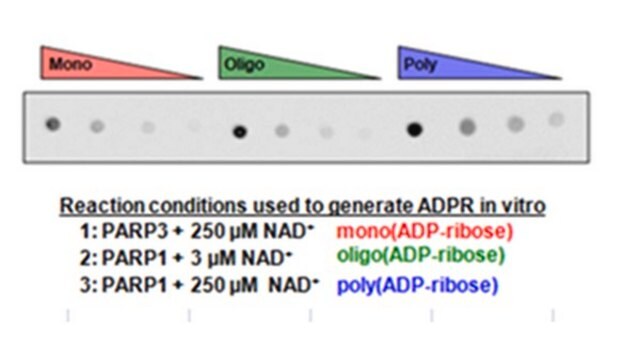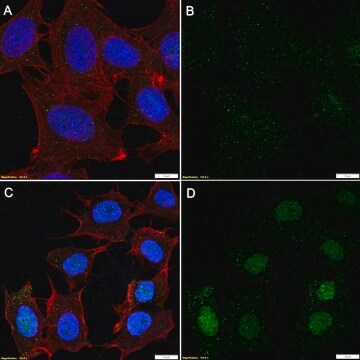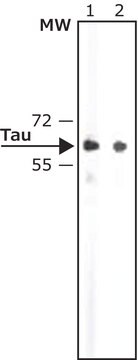MABE1031
Anti-poly-ADP-ribose binding reagent
Anti-poly-ADP-ribose binding reagent is a reagent that selectively binds to ADP ribose for use in Western Blotting, Immunocytochemistry and Dot Blot.
동의어(들):
poly-ADP-ribose binding reagent
로그인조직 및 계약 가격 보기
모든 사진(3)
About This Item
UNSPSC 코드:
12352203
eCl@ss:
32160405
NACRES:
NA.41
추천 제품
생물학적 소스
Escherichia coli
Quality Level
항체 형태
purified antibody
항체 생산 유형
primary antibodies
종 반응성
human, mouse
종 반응성(상동성에 의해 예측)
all
기술
dot blot: suitable
immunocytochemistry: suitable
western blot: suitable
배송 상태
dry ice
타겟 번역 후 변형
unmodified
일반 설명
Cat. No. MABE1031, Anti-poly-ADP-ribose binding reagent, is a His-tagged recombinant protein fused to rabbit Fc tag, expressed in and purified from Rosetta(DE3)pLysS strain of E. coli (Cat. No. 70956). Anti-poly-ADP-ribose binding reagent is useful for the affinity detection of oligo- and poly-ADP-ribosylated (PARylated) proteins on membranes or on fixed cells in a manner similar to antibody-based Western blot, dot blot, and immunocytochemistry applications. The rabbit Fc tag allows visualization of the binding/labeling with conjugated anti-rabbit secondary antibodies. The Fc tag also allows Anti-poly-ADP-ribose binding reagent to be captured on Protein A resins for affinity pull-down applications.
특이성
Two or more units of ADP-ribose
애플리케이션
Anti-poly-ADP-ribose binding reagent is a reagent that selectively binds to ADP ribose for use in Western Blotting, Immunocytochemistry and Dot Blot.
Dot Blot Specificity Analysis: This reagent detected oligo(ADPR) and poly(ADPR) on ADP-ribosylated PARP1 recombinant protein (Lee Kraus, University of Texas Southwestern Medical Center).
Immunocytochemistry Analysis: A representative lot detected oligo(ADPR) and poly(ADPR)/PAR in 3T3-L1 cells (Lee Kraus, University of Texas Southwestern Medical Center).
Immunocytochemistry Analysis: A representative lot detected oligo(ADPR) and poly(ADPR)/PAR in 3T3-L1 cells (Lee Kraus, University of Texas Southwestern Medical Center).
Research Category
Epigenetics & Nuclear Function
Epigenetics & Nuclear Function
Research Sub Category
General Post-translation Modification
General Post-translation Modification
품질
Evaluated by Western Blotting on ADP-ribosylated PARP1 and PARP3 recombinant proteins.
Western Blotting Analysis: This reagent detected oligo(ADPR) and poly(ADPR) on ADP-ribosylated PARP1 recombinant protein (Lee Kraus, University of Texas Southwestern Medical Center).
Western Blotting Analysis: This reagent detected oligo(ADPR) and poly(ADPR) on ADP-ribosylated PARP1 recombinant protein (Lee Kraus, University of Texas Southwestern Medical Center).
표적 설명
Variable depending on the target proteins and the extend of ADP-ribosylation
물리적 형태
Format: Purified
Ni-NTA agarose
Purified from E. coli by Ni-NTA agarose. Supplied in buffer containing 10 mM Tris pH 7.5, 0.2 M NaCl, 10% Glycerol, 10 mM Imidazole, 1 mM PMSF, 1 mM β-Mercaptoethanol, 10% glycerol without preservatives.
저장 및 안정성
Stable for 1 year at -80°C from date of receipt.
Handling Recommendations: Upon receipt and prior to removing the cap, centrifuge the vial and gently mix the solution. Aliquot into microcentrifuge tubes and store at -80°C. Avoid repeated freeze/thaw cycles, which may damage IgG and affect product performance.
Handling Recommendations: Upon receipt and prior to removing the cap, centrifuge the vial and gently mix the solution. Aliquot into microcentrifuge tubes and store at -80°C. Avoid repeated freeze/thaw cycles, which may damage IgG and affect product performance.
기타 정보
Concentration: Please refer to lot specific datasheet.
면책조항
Unless otherwise stated in our catalog or other company documentation accompanying the product(s), our products are intended for research use only and are not to be used for any other purpose, which includes but is not limited to, unauthorized commercial uses, in vitro diagnostic uses, ex vivo or in vivo therapeutic uses or any type of consumption or application to humans or animals.
적합한 제품을 찾을 수 없으신가요?
당사의 제품 선택기 도구.을(를) 시도해 보세요.
Storage Class Code
12 - Non Combustible Liquids
WGK
WGK 2
Flash Point (°F)
Not applicable
Flash Point (°C)
Not applicable
시험 성적서(COA)
제품의 로트/배치 번호를 입력하여 시험 성적서(COA)을 검색하십시오. 로트 및 배치 번호는 제품 라벨에 있는 ‘로트’ 또는 ‘배치’라는 용어 뒤에서 찾을 수 있습니다.
Sridevi Challa et al.
eLife, 11 (2022-04-28)
ADP-ribosylation (ADPRylation) is a reversible post-translation modification resulting in the covalent attachment of ADP-ribose (ADPR) moieties on substrate proteins. Naturally occurring protein motifs and domains, including WWEs, PBZs, and macrodomains, act as 'readers' for protein-linked ADPR. Although recombinant, antibody-like ADPR
Charlotte Blessing et al.
Nature communications, 13(1), 4762-4762 (2022-08-14)
Cells employ global genome nucleotide excision repair (GGR) to eliminate a broad spectrum of DNA lesions, including those induced by UV light. The lesion-recognition factor XPC initiates repair of helix-destabilizing DNA lesions, but binds poorly to lesions such as CPDs
Xin Luo et al.
Molecular cell, 65(2), 260-271 (2017-01-21)
Poly(ADP-ribosyl)ation (PARylation) is a post-translational modification of proteins mediated by PARP family members, such as PARP-1. Although PARylation has been studied extensively, few examples of definitive biological roles for site-specific PARylation have been reported. Here we show that C/EBPβ, a key
Tom P Aird et al.
American journal of physiology. Endocrinology and metabolism, 321(6), E802-E820 (2021-11-09)
Sprint interval training (SIT) is a time-efficient alternative to endurance exercise, conferring beneficial skeletal muscle metabolic adaptations. Current literature has investigated the nutritional regulation of acute and chronic exercise-induced metabolic adaptations in muscle following endurance exercise, principally comparing the impact
Dragomir B Krastev et al.
Nature communications, 9(1), 2016-2016 (2018-05-24)
Poly (ADP-ribose)ylation is a dynamic protein modification that regulates multiple cellular processes. Here, we describe a system for identifying and characterizing PARylation events that exploits the ability of a PBZ (PAR-binding zinc finger) protein domain to bind PAR with high-affinity.
자사의 과학자팀은 생명 과학, 재료 과학, 화학 합성, 크로마토그래피, 분석 및 기타 많은 영역을 포함한 모든 과학 분야에 경험이 있습니다..
고객지원팀으로 연락바랍니다.







